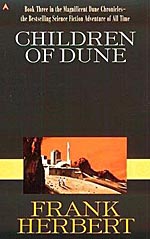
![]() verkisto
verkisto
7/26/2016
![]()
It's fascinating to see the development of the Dune series. The first novel was a great examination of how leaders come to power; Dune Messiah was about the regrets that power can create in said leaders; and now Children of Dune is about tearing down that structure of power through corruption and conspiracy. It makes for a great overall examination of power, and I wonder how much of it Herbert had in mind when he first started writing the first book. The second and third books read almost like an apology for the first, but all together, the trilogy feels very complete.
Children of Dune isn't a fast read, nor do I feel like it's necessarily an easy read. That's not to say that the prose is dense, or impenetrable; it's just a much more philosophical novel than the first book in the series. It requires a bit more attention than Dune itself (which is also true for Dune Messiah), but I feel like it's a worthwhile effort. The story focuses on Paul's legacy, Alia, who is now possessed by the spirit of Baron Harkonnen, and Ghanima and Leto II, the twin children of Paul. Each character takes on a different aspect of power, with Paul's legacy representing power gone wrong (with the knowledge that it's gone wrong), Alia representing power as corruption, and with the twins representing power through revolution. That each character also has a god-like status also speaks to power reluctantly given by the people, but I felt like the heart of the story was wrapped up in those characters and their representation of power.
At the start of the novel, Alia is the ruler of the galaxy, and has been fulfilling the ideals of Paul and the Fremen. Paul's legacy is being besmirched by the Preacher, a blind, nameless figure who encourages people to return Arrakis to its original state, and we already know from Dune Messiah that Paul was unhappy with where his rule ultimately went. Alia is fighting against this, with honorable intentions, but then she allows herself to be possessed by Baron Harkonnen, and then she becomes corrupted by the desire for power as she tries to destroy the Atreides line. Ghanima and Leto, though, conspire to bring down Alia, and in the process adopt a rule that combines both ideals.
Ultimately, in order to bring about the proper change, it means that existing rulers have to die. Even the Preacher goes to this extreme, as he has Leto tested, with the price of failure being death. In the end, Alia and the Preacher die in order for Leto to rise to power. Given the state of the struggle, it makes sense that this has to happen -- all three of them are extremely powerful, and their ideals for ruling are incompatible -- but I found it interesting that once Leto gained power, he still acted like a despot. Is Herbert saying that power, no matter how well-intentioned, is still a corrupting factor?
I wound up giving Children of Dune four stars, but mostly because of its part in the original trilogy of stories. By itself, the book isn't a four-star book, but when you look at the first three books together, you get a fascinating picture of societies and power. I did the same thing with George R.R. Martin's A Feast for Crows; it wasn't really a five-star book, but the entire series is five-star, and its part of that series is undeniable. As a result, I wouldn't recommend anyone try to read this as a stand-alone book.